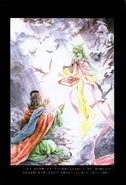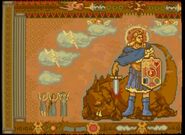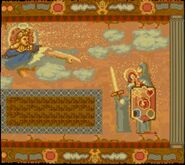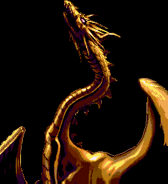Khaled.abduljader (talk | contribs) No edit summary Tag: Visual edit |
(Adding categories) |
||
| Line 102: | Line 102: | ||
[[Category:Recurring Characters]] |
[[Category:Recurring Characters]] |
||
[[Category:Background characters]] |
[[Category:Background characters]] |
||
| + | [[Category:Female Characters]] |
||
Revision as of 22:49, 28 November 2017
—Naga to Chrom after the Awakening.
Naga (ナーガ Nāga, alternatively translated Narga in Fire Emblem TREASURE) is a recurring character in the Fire Emblem series, specifically the Archanea and Jugdral Series. The leader of the Divine Dragons, her sympathy for humanity and great power led to her often being hailed as a deity by humans.
Historically involved in a number of mankind's conflicts, she is responsible for the creation of numerous holy weapons and items, including both Falchions, the Shield of Seals and the Book of Naga, as well as having her Holy Blood carried through both the ruling dynasty of Grannvale, and the Ylissean royal family.
Profile
Archanea Series
Naga was the leader and the queen of the Divine Dragon tribe of Dragons, when Dragons began to decline, Naga proposed it was because Dragons were destined to fade in place of humanity, and it was now the duty of Dragons to guide them. Obeying the advice of the Dragon tribe Elders, Naga, and all of the Divine Dragon tribe sealed their power in stones, and became Manaketes. However many dragons did not heed this warning, and started Degenerating. Led by many in the Earth Dragon tribe, many dragons began attacking humanity out of spite for dragonkind's decline.
With the help of the rest of the Divine Dragons, Naga took the part of protecting mankind from the Earth Dragons by utilizing the powers of the Shield of Seals, which she forged from her own fangs. Naga was one of the first Dragons to take human form to preserve sanity and avoid degeneration at the advice of the Dragon Tribe Elders. After the Degenerated Earth Dragons were sealed, Naga created the sword Falchion from yet another one of her fangs and ordered the surviving Earth Dragon prince, Medeus, to guard the seal.
Shortly before her death, she placed her newborn daughter, Tiki, into a deep sleep, as Naga feared Tiki's great power would cause her to go mad. She then entrusted fellow Divine Dragon Gotoh with the task of watching over humanity in her place and ensuring that Tiki did not go degenerate and annihilate humanity. Thus Gotoh was tasked with keeping Tiki asleep at all costs, particularly if the Shield of Seal's decision was lost.
In the remake, Fire Emblem: Shadow Dragon, the new addition of Nagi is hinted to be a reincarnation of Naga, if not Naga herself. Nagi bestows a weaker version of the Falchion upon Marth, attempting to make up for the original one that he did not possess. Medeus later further implies that Nagi is the reincarnation of Naga, stating that he is not the only Manakete resurrected. Nagi's ending title in the Japanese version of the series is that of the "Divine Dragon King's Incarnation", further supporting this point.
Jugdral Series
Naga, taking the form of a young maiden, was one of the dragons who blood-bonded with the Twelve Crusaders during the Miracle of Darna, specifically Saint Heim, who would wield the tome named after her. Heim and the Book of Naga would prove to be crucial in the defeat of Loptyr and his then-present host, Galle XVII, with her power being the only hope of truly piercing that of Loptyr. As a result of this blood bond, Naga's holy blood was passed on through the descendants of Heim, the ruling dynasty of Grannvale.
Official developer notes later reveal that Naga transferred her will into Heim with the Book of Naga [1], similar to what Loptyr did with Galle, and later Julius, and what Forseti would later do with Lewyn. This possession proved that, with Naga as the leader of the dragons, her human vessel would be the leader of the Crusaders.
Awakening
Long after the events of Marth's saga, Naga eventually bestowed her power upon the First Exalt to defeat the Fell Dragon Grima, with most descendants of Ylissean royalty, as with Heim's descendants, bearing Naga's Holy Blood as the Brand of the Exalt (Mark of Naga in the Japanese version) on their body, as part of their inheritance.
By the time of Awakening, because of her role in sealing the Fell Dragon, she is considered a god, hailed as the benevolent Divine Dragon who protected mankind, with the formation of Ylisse centered around worshipping her. This extends even to the few remaining manaketes, as Nah's supports with male Morgan declares she's considered a deity to them, with her even praying to Naga and occasionally getting an answer.
After Grima's resurrection, Chrom arrives at Mount Prism to perform the Awakening. Chrom's will is tested and is accepted by Naga, who unlocks the Falchion's true power, allowing it to become the Exalted Falchion. When questioned if this will grant him the power of a god, she admits that neither she nor Grima are gods to the party, with her title being mankind's doing. She also reveals that even with her blessing imbued on the Falchion, it will only seal him for another thousand years after weakening him and using the blade in the final blow, with the only method to truly end Grima being he himself causing his demise, which he would never do willingly. Without much time to delve further, Naga points them to Origin Peak where Grima is quickly regaining power.
Upon arrival at the peak, Naga reminds them that she cannot kill Grima, to which the Avatar finishes that she can only seal him. Naga confirms this, calling the Avatar "Fellblood", due to the Avatar possessing power similar to Naga’s own, and knowing of the Avatar's origins. The Avatar then realizes that, because of their link to Grima, if they deal the final blow, Grima can be killed once and for all, as it would be the same as being killed by his own hand. Hearing that, Chrom realizes that they can end the battle at last, but Naga warns them that such a thing would have dire consequences: Because Grima and the Avatar are linked to such a degree, killing Grima like that would most certainly kill the Avatar as well. Though she adds that the bonds that the Avatar forged can possibly return the Avatar to the mortal plane, the odds are so infinitesimal that the most likely result was the Avatar ceasing to exist in the process.
After defeating the last few Plegians, Naga explains that Chrom must strike at the nape of the neck, where Grima is weak at, but Grima will have forces ready to protect that area. Naga then offers to send everyone onto the Fell Dragon’s back for their final battle, only for him to severely weaken the army and pull the Avatar into a void after doing so. After the Avatar breaks free from the void, Naga uses her powers to restore the army strength and they engage Grima in battle. Naga leaves the final decision to slay Grima to Chrom and the Avatar. Regardless of choice, Naga will thank Chrom and the Avatar for ending Grima's impending destruction of the world.
The Future Past
In the Future Past DLC chapters, the Outrealm Naga is killed by Grima, through unknown means. The Naga of the current world summons Chrom and his army to assist 12 children on their quest to recover the Fire Emblem and the 5 gemstones so they can defeat Grima once and for all. After recovering the Emblem and the Gemstones, Lucina is able to perform the ritual. However as Naga is dead, Tiki, who was previously killed by Grima, becomes the new Naga of that realm. When the Awakening is performed, Tiki accepts Lucina's will and unlocks the Falchion, allowing her to seal Grima once more.
Echoes: Shadows of Valentia
Long before the events of Echoes, Duma battled Naga for unknown reasons, and even though she had won, she decided to exile him instead of killing him. Before he left Archanea with his younger sister Mila though, Naga created a sword from one of her fangs in the event that they succumbed to degeneration, eventually being named Falchion. This Falchion is implied to have been made long before the Archanean one, with Mila describing it as the "one and only godslaying sword".
Personality
While Naga only directly appears in Awakening, it can be said that she possesses a great love for humanity, yet is also considered as distant and almost cold by human standards, as despite her sincere desire to protect humans to the point of granting them power numerous times, she never was too fond of interacting directly with them, unless it was truly needed, even telling Forseti.
Said love for mankind tends to partially cloud her judgement at times, as some of her decisions can be considered extremist and questionable, such as ordering killing her daughter if it meant protecting humanity from her degeneration like the other dragons despite placing her into a deep slumber.
Contrary to most other Manaketes, Naga appears to be surprisingly humble, to the point where although she is worshiped as a deity, she acknowledges she is nothing more than an exceptionally powerful Manakete.
In Awakening, Naga shows a more laid back side, encouraging Nah and Morgan to get together when prayed to by the former. She also is noted by Nah to have a dry sense of humor.
Gender
In the original Archanea Series, Naga is referred to as male, referred to with masculine terms by Xane, and even being depicted as a blonde warrior in the opening cutscenes of Mystery of the Emblem. The item description of the Falchion states that the sword is "a gift from the Divine Dragon King." However, Naga never made a direct physical appearance in a male form. While the terms used for Naga are masculine, the word "King" is gender neutral in Japanese, making its gender ambiguous.
Naga has had more evidence of being female as Nagi, a female Manakete, is said to be a reincarnation of Naga and even has the power to create a Falchion much like the original Naga. Naga's appearances in Genealogy of the Holy War and Awakening show a female Naga. In Echoes, in the Duma amiibo dungeon, Naga is referred to using female pronouns, though she does not make a direct appearance. It is possible that when Naga was depicted as a male warrior god it could be because humans depicted Naga as a god and had no way of knowing Naga's actual gender. Alternatively, the male warrior god depicted in Mystery of the Emblem could have been a vessel of Naga's, and not Naga herself. Similar to how Heim came to be such a vessel himself
Its possible the differences about Naga in Awakening is due to not being the original, as she's never referred to as Tiki's mother in the game and The Art of Awakening saying her connection to the original Naga is unknown.
Another potential reason for this discrepancy in gender is revealed via the Future Past DLC storyline in Awakening where Naga may be simply a title, given to a Divine Dragon who has ascended and taken on the role of spiritual guardian of the world. This adds more ambiguity to Naga's character, implying that the "Naga" throughout history could very well be differing individuals. Tiki's actions during The Future Past 3 exemplifies this, when Tiki took the role as the new Naga of the world for the alternate future.
Non-Canon Appearances
Tokyo Mirage Sessions ♯FE
While Naga itself does not make a physical appearance, it is mentioned she played a role in the game's distant past. When Gharnef and Medeus originally threatened Archanea, she helped seal Gharnef away by taking the drastic measure of cleansing the world of all Performa in order to prevent his escape and Medeus's resurrection. In doing so, she also eliminated the performing arts from her world.
During the final boss fight of the game, Tiki calls upon Naga to grant her power to assist the player using the 'Naga's Blessing' skill which fully restores each member's HP.
Trivia
- Although this is not explicitly stated in Path of Radiance or Radiant Dawn, the character Kurthnaga's name is derived from a combination of both Naga and Prince Kurth's.
- The King of the Emiyu in the backstory of TearRing Saga: Utna Heroes Saga appears to be based on Naga.
- In Awakening, Naga shares her English voice actress, Mela Lee, with Tiki.
Etymology
The Nāga is a group of serpent deities in Hindu and Buddhist mythology, and usually assume the form of a king cobra. Nāga may also refer to an ordinary snake, or even a tribe of people. A female Nāga in deity form is known as a nāgī.








